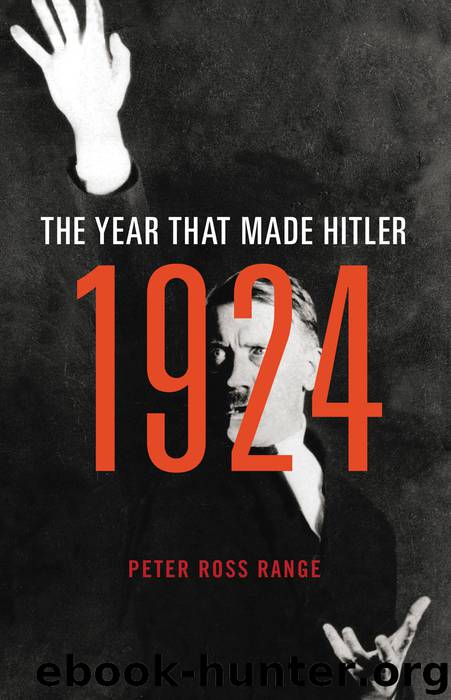1924: The Year that Made Hitler by Peter Ross Range

Author:Peter Ross Range
Language: eng
Format: epub
Tags: History / Europe / Germany, History / Holocaust, History / Military / World War Ii
Publisher: Little, Brown and Company
Published: 2016-01-25T16:00:00+00:00
Stenglein’s drastic move made headlines. “Hitler Trial Session Blown Up,” declared the Vossische Zeitung on its front page; “You’ve Gone Too Far,” headlined its columnist. Foreign newspapers were taking notice. All regarded the prosecutor’s stormy departure as a withering indictment of Neithardt’s trial management and a scandalous day for the German justice system. Clearly the presiding judge did not have his trial under control; he lacked the confidence and competence to preside over strong personalities. The young deputy prosecutor Hans Ehard was taken aback by Stenglein’s move, which he regarded as a tactical mistake. “He should have banged on the table instead and complained loudly to the judge,” said Ehard. “But of course he would probably have lost out in that confrontation.”23
By the next day, Attorney Kohl had apologized—sort of—and Prosecutor Stenglein was back on the job. People could return to focusing on what had become the central question of the trial: how deeply were Kahr, Lossow, and Seisser implicated in Hitler’s plot? Originally scheduled to last two weeks, Hitler’s trial would now enter a third week devoted solely to answering that question.
Hitler’s best-defense-is-a-good-offense strategy was working. Watching from his small defense table at the front of the courtroom, reading every night the voluminous newspaper coverage of his trial in his spartan cadet’s room, Hitler could see that things were moving in his direction. The two-week drumbeat of recrimination against Kahr, Lossow, and Seisser had built a large base of credibility in the press corps and in public opinion. Pressure was building on State’s Attorney Stenglein to do something. Over the weekend, the dam of expectation finally burst; Stenglein announced an investigation of Kahr, Lossow, and Seisser on suspicion of high treason. The trial now officially had become what one Munich newspaper, retrospectively, would describe as “a competition between two forms of nationalism—the old nationalists around Kahr and the young völkisch types around the admired, God-sent Leader.”24 The three men who had played a central role in crushing Hitler’s putsch, who were expected to deliver the most incriminating evidence against him, and who represented the existing order in terms of oath, uniform, and responsibilities now faced the possibility of treason charges.
This posed a strange dilemma for the prosecutor: he was calling as witnesses men whom he had just started investigating for a crime. But then, as one newspaper headline put it later in the week, this was “A Strange Trial.”
On Monday, March 10—the first day of the critical third week—everyone was relieved to find Munich experiencing milder temperatures and melting snows.25 Yet even as spring beckoned, the trial threatened to darken with the confrontational testimony of the triumvirs. Whatever they said or did would reflect well or badly on the authority of government, on the reputation of Bavaria in the larger German republic, and on the men themselves. Their performance was now shaped entirely by the man who would only be sitting and watching, waiting for openings to pounce and corner them. The trial had become a high-stakes game of
Download
This site does not store any files on its server. We only index and link to content provided by other sites. Please contact the content providers to delete copyright contents if any and email us, we'll remove relevant links or contents immediately.
| Holocaust |
Cecilia; Or, Memoirs of an Heiress — Volume 1 by Fanny Burney(31335)
Cecilia; Or, Memoirs of an Heiress — Volume 3 by Fanny Burney(30935)
Cecilia; Or, Memoirs of an Heiress — Volume 2 by Fanny Burney(30891)
The Secret History by Donna Tartt(16633)
Sapiens: A Brief History of Humankind by Yuval Noah Harari(13058)
Leonardo da Vinci by Walter Isaacson(11906)
The Radium Girls by Kate Moore(10909)
Sapiens by Yuval Noah Harari(4540)
The Wind in My Hair by Masih Alinejad(4425)
How Democracies Die by Steven Levitsky & Daniel Ziblatt(4400)
Homo Deus: A Brief History of Tomorrow by Yuval Noah Harari(4282)
Endurance: Shackleton's Incredible Voyage by Alfred Lansing(3845)
The Silk Roads by Peter Frankopan(3763)
Man's Search for Meaning by Viktor Frankl(3636)
Millionaire: The Philanderer, Gambler, and Duelist Who Invented Modern Finance by Janet Gleeson(3570)
The Rape of Nanking by Iris Chang(3518)
Hitler in Los Angeles by Steven J. Ross(3439)
The Motorcycle Diaries by Ernesto Che Guevara(3337)
Joan of Arc by Mary Gordon(3260)
